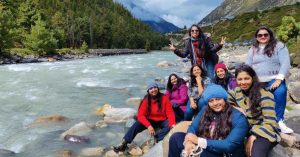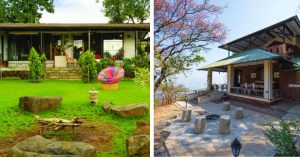Learn Pottery & Mandana Art at this Rajasthan Eco-Lodge That Runs on The Sun
Looking for a tradition homestay in Rajasthan? Ramesh Chandra Jangid's Apani Dhani Eco-Lodge runs on solar energy, grows organic food, harvests rain and offers the most interesting craft classes.
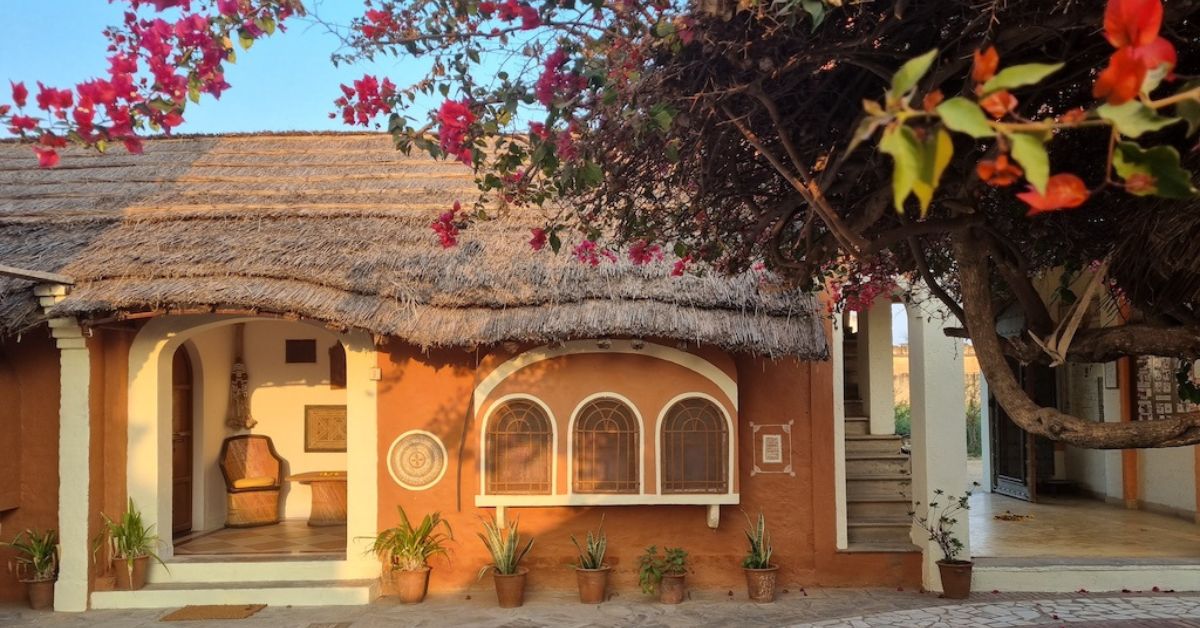
India is renowned for its rich tapestry of diverse cultures, and one of its most vibrant states is Rajasthan. Situated in the northwestern region of the country, Rajasthan stands as a testament to the opulent and vibrant lifestyle of its rulers throughout history. Adorned with majestic palaces, vibrant markets, and timeless traditions, each city within the state weaves together a tapestry of music, dance, art, and cuisine.
If you have not visited this outstanding example of India’s rich culture and heritage yet, then this is your sign! Every niche and corner of the state has something unique to offer.
Amidst the cultural splendour, there is an array of resorts and hotels that offer visitors the quintessential Rajasthani experience, but there is one you cannot miss. Among the myriad high-end establishments of the state stands a labour of love – Apani Dhani.
Apani Dhani is the manifestation of Ramesh Chandra Jangid’s two passions – serving people and preserving nature. “I am deeply committed to the preservation of nature while simultaneously supporting local communities and providing our guests with the most authentic experience possible,” he shares with The Better India.
Labour of love and passion
Located in Nawalgarh, a city in the heart of the Shekhawati region of Rajasthan, the eco-stay is run by Ramesh and his family. However, this family-run stay is not Ramesh’s first try at the hospitality industry and also not his first dream.
Ramesh shares that as a young boy, he harboured a dream of becoming a pilot and seeing the world.
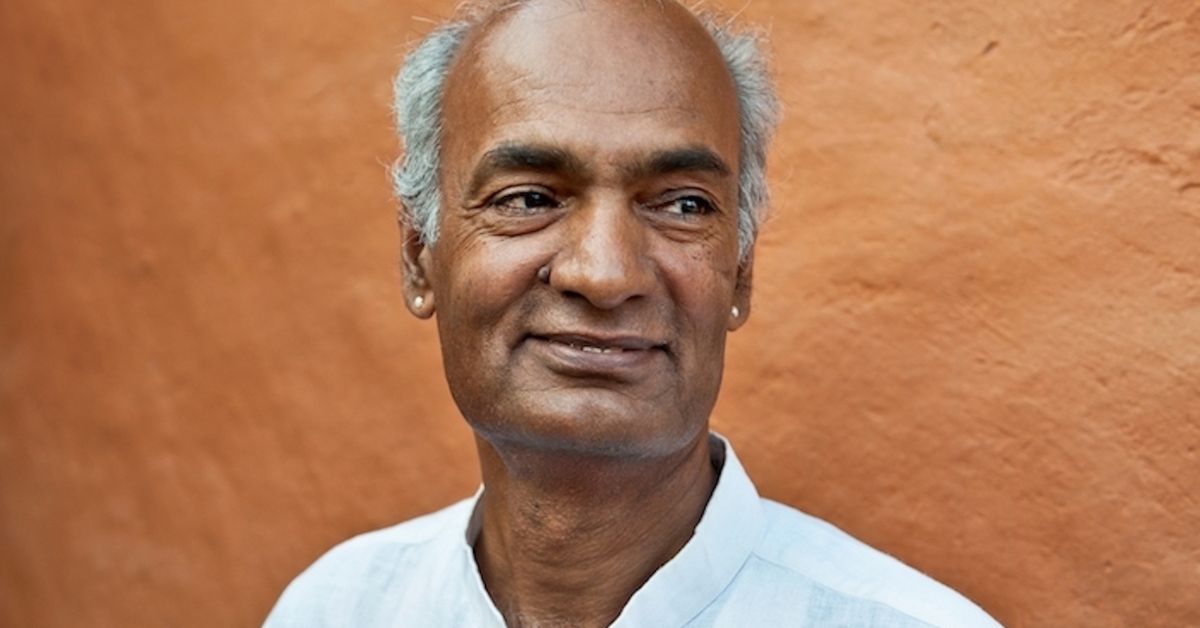
“Born into a carpenter’s family in 1952, with meagre financial resources, I harboured a dream of becoming a pilot. In 1972, I was selected for a Gliding Instructors course in Pune. Achieving my Gliding Instructor rating in 1973, I served as the Instructor In-Charge at the Agra Gliding Club from 1975 to 1979,” he recalls.
Set on his path, he travelled across Germany and Europe to pursue his passion and take part in international gliding competitions and races.
“It was on visits to Germany that I met with some environmentalists and activists who harboured in me a passion for environment preservation,” he recalls.
Ramesh studied the various ill effects of mass tourism on a given region. “This was back in the 80s when terms like sustainability and eco-tourism were unknown to many. After achieving much in my gliding career, I started to feel that I wanted to do something back home,” he says.
By this time, his passion for nature conservation was at a peak and he wanted to try his hand at eco-friendly tourism.
“In the 1980s, my vision of a ‘different type of tourism’ began to take root. Inspired and motivated by various factors, I embarked on this venture.” he says.
He adds, “The monopoly and inequitable distribution of tourism income in our state served as the strongest catalyst, propelling me to initiate a new approach to tourism in Rajasthan.”
Initially, he started a small homestay and then a travel company before venturing on to Apani Dhani. “In 1990, I established Apani Dhani with a triple objective: to promote and preserve local built and intangible heritage, minimise the environmental impact of tourism on natural resources, and foster socially and economically responsible tourism practices.”
A true taste of Rajasthan
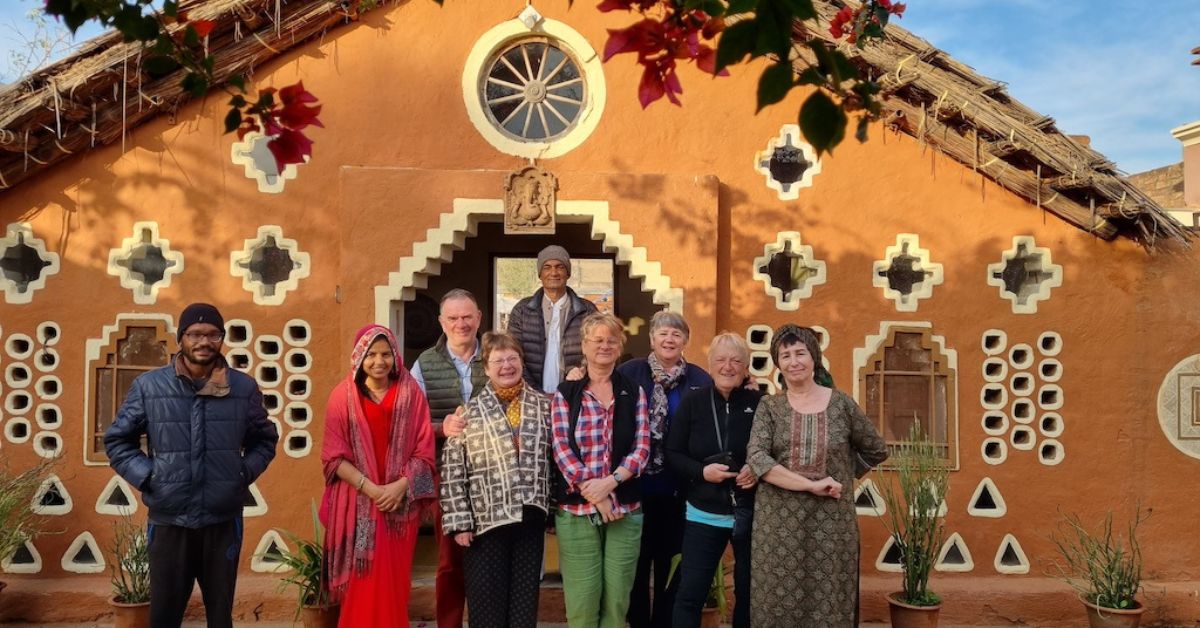
Reflecting on the early stages of building the stay, Ramesh recollects, “My belonging to a different section of society stirred unease among the local barons, who collectively sought to obstruct my path to success. The time belonged to a different era; now, we boast some of the highest ratings in foreign travel guidebooks, yet sadly, we are not featured in the brochure of the Department of Tourism.”
When we refer to Apani Dhani as a labour of Ramesh’s love, it epitomises how he invested all his savings into his dream eco-stay.
“Apani Dhani has been conceived and designed by me according to my own dreams and financial resources, without any external support for its development. I reinvested the benefits to fuel its growth, resulting in a slow but organic progression.”
Discussing some of the unique experiences that a guest receives at the stay, he says, “We offer a variety of activities to our guests, aimed at providing them with a comprehensive exploration of our culture and the chance to interact with members of the local community, all while ensuring fair supplementary income for them. These activities encompass various aspects of our heritage and traditions, without compromising on authenticity.”
Guests can enjoy craft workshops including tie-dye, bangle making, pottery, Mandala drawing, and handmade recycled paper, along with cookery classes.
“We also have guided excursions to explore Shekhawati’s unique heritage, countryside outings such as bicycle tours and camel cart strolls, and live music programs,” he adds.
Sustainability at its very core
In 2013, Apani Dhani Ecolodge won the Responsible Tourism Award from Wild Asia in the category Best in Cultural Preservation.
Explaining how the building in itself embodies sustainability, Ramesh says, “We initially used locally-acquired clay for the walls and pampas grass for the roofs in our initial huts, while our yoga hall, dining room, and family room feature rammed earth walls. For the two new rooms constructed during the Covid-19 pandemic, we utilised AAC blocks for the walls and stone slabs for the roofs.”
Besides, the eco-stay follows a plethora of sustainable practices to keep the nature around it intact.
He says, “My commitment to ecotourism and sustainable travel predates its global buzzword status. Sustainable, environmentally-friendly practices have long been ingrained in our daily operations.”
The guests are guided towards sustainable personal use of water resources in our semi-arid environment, with practices such as rainwater harvesting implemented at the stay.
“Besides using photovoltaic panels and solar water heaters, all the meals are served in disposable and compostable leaf plates, and we offer a sustainable and responsible laundry service,” he says.
Additionally, they compost all their wet waste which is later used in their fields.
“All the food that our guests eat is sourced from our organic fields, which cultivate vegetables, cereals, pulses, oilseeds, and more. We refrain from using chemical fertilisers, ensuring that all crops are grown naturally,” he shares.
“We encourage travellers, whenever possible, to participate in non-polluting activities such as walks, cycling and camel cart excursions,” he adds.
Additionally, in a bid to keep their promotion activities in line with their philosophy, the eco-stay’s business cards, cookery books, and brochures on hand-made recycled paper.
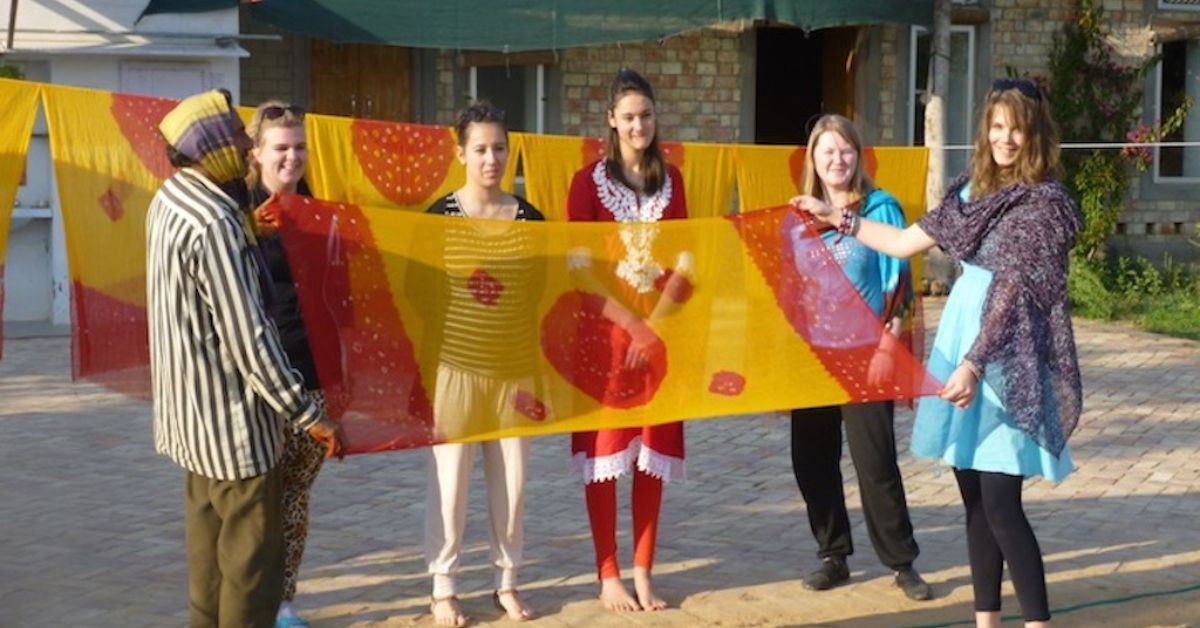
Since it opened its doors, the eco-stay has hosted over 15,000 guests so far. With an average of 4.4-star reviews on Google, the place has become a favourite of the guests. “The place has amazing food and is a great place to experience bangle making and tie-dyes among other activities. The hosts were gracious and made our stay comfortable,” wrote Venkatesh Bhattaram who stayed at the eco-stay.
“The key to ensuring our guests’ comfort lies in the involvement of my family. We strive to make them feel like a part of our own family, attending to their every need. Additionally, the inclusion of homemade regional cuisines enhances the homely experience for our guests,” he states. If you found our stories insightful, informative, or even just enjoyable, we invite you to consider making a voluntary payment to support the work we do at The Better India. Your contribution helps us continue producing quality content that educates, inspires, and drives positive change. Choose one of the payment options below for your contribution- By paying for the stories you value, you directly contribute to sustaining our efforts focused on making a difference in the world. Together, let’s ensure that impactful stories continue to be told and shared, enriching lives and communities alike. Thank you for your support. Here are some frequently asked questions you might find helpful to know why you are contributing?

(Edited by Padmashree Pande; All Pictures credit: Apani Dhani)
This story made me
-
97
-
121
-
89
-
167





